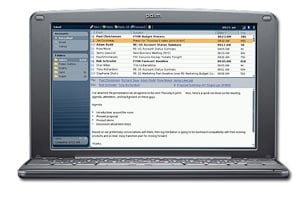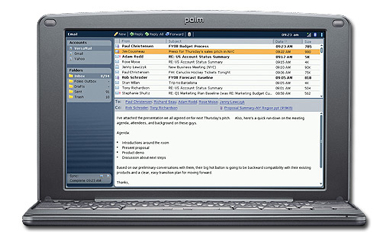Foleo Cancelled, A Curious Absence

All the latest news, reviews, and guides for Windows and Xbox diehards.
You are now subscribed
Your newsletter sign-up was successful

Here's me over at TreoCentral, reporting on Palm's big news yesterday afternoon:
Colligan states that Palm wants to focus their development efforts on the Linux Smartphone Platform, though he did write that Palm still plans on developing the a "Foleo II" and releasing it sometime in the future -- based on the new "unified platform."
Read: treocentral.com >> Stories >> Business >> Foleo Cancelled!
It looks like the overnights are in and the results are good for Palm. Sure, it's a black eye, but a black eye is better than walking around with your pants down. Reading over the reactions, I'd say it's about 10 "good move, Palm" to 1 "aww, bummer." Note that I've yet to come across a single "Palm, you idiots, don't cancel this!" reaction.
Even to the bitter end, I gave the Foleo the benefit of the doubt; which is to say "I seriously doubt the Foleo will work, but I kinda hope I'm wrong."
More after the break
Who was the Market?
I've said myself and I've read elsewhere (to many places and too long ago to properly cite) that the Foleo seemed to be designed specifically with me as a tech journalist in mind. Carrying it around conferences, using it during interviews, blogging on the go all would have been easier and better.
It also hit me hard as a former grad student - carrying this thing to classes and the library would have saved me quite a lot of pain and sorrow. In some ways I'm sorry that Palm didn't push the student aspect of it harder - though I understand why they didn't: their desire to focus on email (more on that below), cost, and perhaps the relative failure of the Newton eMate. The eMate, if you'll recall, was based on a popular PDA format translated into a mini-laptop form factor. Sound familiar? The eMate (the "e" is for "Education") didn't fly, either.
All the latest news, reviews, and guides for Windows and Xbox diehards.
No, the target market from the Foleo, as stated by Palm from the get-go, was "Business Executives." This was why the email app got its own big button on the Foleo. This was also why Palm felt it could charge an outrageously exorbitant amount of money for it, apparently. Despite what you'll hear from motivational speakers, however, not everybody is an executive - it's not that large of a demographic. Of course, I'm sure Palm planned on expanding the market beyond executives and technophiliacs - but how exactly they were going to do that is beyond me.
Mobile Companion
The is the heart of the Foleo debate - just what niche does the Foleo fall into? This is another reason that the Foleo was a bit of a tech journalist dream - it gave us a chance to rethink the categories we use to think about gadgets. That was clearly Palm's intention - to shake up our preconceptions about what gadgets are. But the idea of a "Mobile Companion" was complicated from the start. Unlike the original Palm and also unlike the Treo, the Foleo didn't have an instant "AHA" moment when you saw it. Instead, it took a bit of explanation for you to understand that this was a thin client for your smartphone - or perhaps a thin client for your desktop via your smartphone - or perhaps a linux appliance - or perhaps ... you get the point.
Again, I'll come back to something I've said before about the Foleo - it was simultaneously three years late and three years early. In the form that we saw, it was clearly three years late - the technology and the ideas behind it were all here three years ago (it was, after all, little more than a Palm TX on the inside). Three years ago we certainly would have been wowed by the Foleo and by Palm's forward-thinking. Three years too late also? You bet. If the Foleo was supposed to really be a thin client for a smartphone, then the smartphone would need to be something better than what we have now - a phone that would have the power, storage, flexibility, and connectivity that we typically associate with laptops nowadays. We're close, but I'm thinking of somewhere in the neighborhood of 30 gigs of storage, faster processor, longer battery life, ... an uber-smartphone. They'll get here someday and when they do there really will be a market for a "mobile companion."
That, in the end, is where the Foleo failed. Palm said again and again that the Foleo wasn't meant to replace your laptop. Here's the rub: it should have been able to replace your laptop. On its own, perhaps not, but in conjunction with an uber-smartphone, yes. That's why I say that the Foleo was three years too early - smartphones just don't deserve to have "mobile companions" yet.
So it's good that Palm is focusing its efforts on just the smartphone OS - more competition should bring the day we have a smartphone worthy of a Foleo that much sooner. It's also important to note that Palm will continue to support Windows Mobile, bringing their "special sauce" of UI improvements to the platform (Yay for threaded SMS!)
A Curious Absence
So now what? Now we wait for Foleo II, I guess. Strangely, though Colligan's decision to Ax the Foleo has been almost universally praised, there's suddenly a hole in the market right now. Palm almost succeeded in creating their brand new "3rd category" of mobile devices. Now that they've tried, suddenly tiny laptops seem overburdened with cruft, UMPCs (even super-hot ones like the HTC Shift) seem to be trying to fit too much in too small a space.
A UMPC with a UMPC-specific OS designed to sync automatically with your smartphone and perhaps (finally) with "the cloud" directly would actually be pretty neat. Now that the Foleo is just an idea without all the hassles that a real-world device with real-world bugs and hassles brings, I almost feel it's more compelling. Unburdened of its physical form, the "Platonic Ideal" of a "Mobile Companion" is something that's really compelling.
...In a few years.

Home to the most invested and passionate Microsoft fans, Windows Central is the next generation destination for news, reviews, advice and buying recommendations on the Windows, PC and Xbox ecosystems, following all products, apps, software, AI advancements, and accessories. We've been around for more than decade, and we take our jobs seriously. Windows Central writers and editors value accuracy and editorial independence in everything we do, never receiving compensation for coverage and never pulling punches.
